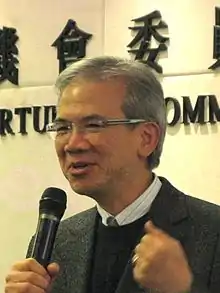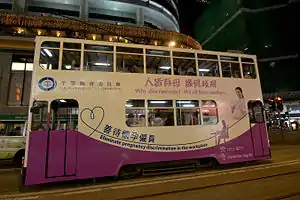Equal Opportunities Commission (Hong Kong)
The Equal Opportunities Commission (EOC) is a statutory body responsible for implementing the Sex, Race, Disability, and Family Status Discrimination Ordinances in Hong Kong. The Commission was established in 1996 as an independent body to investigate complaints, facilitate mediation and take legal action against offenders.[3]
平等機會委員會 | |
 | |
| Abbreviation | EOC |
|---|---|
| Formation | 20 May 1996[1] |
| Type | Statutory body |
| Legal status | Active |
| Headquarters | 16/F, 41 Heung Yip Road, Wong Chuk Hang |
| Location | |
| Services | Investigation Advocacy Advisory |
| Fields | Human rights |
Chairperson | Ricky Chu Man-kin |
| Cecilia Chan Lai-wan Andy Chiu Man-chung | |
| Expenses (2018) | HK$125,967,377[2] |
| Website | Official website |
| Equal Opportunities Commission | |||||||||
|---|---|---|---|---|---|---|---|---|---|
| Traditional Chinese | 平等機會委員會 | ||||||||
| |||||||||
History
Background
The Hong Kong government has had a history of opposing anti-discrimination legislation.[4]:337 When the United Kingdom ratified the Convention on the Elimination of All Forms of Discrimination Against Women (CEDAW) in 1986, the effect of CEDAW was extended to other British dependent territories.[5]:22 However, the Hong Kong government requested that CEDAW to not be extended to Hong Kong until it could assess its effect,[6]:9 claiming that the ratification of CEDAW might lead to "significant economic and social consequences".[7] Specifically, the government believed that CEDAW and anti-discrimination legislation would affect Hong Kong's laissez-faire market and traditional Chinese customs that treat men and women differently.[5]:22–23
In the 1990s, the Hong Kong government was increasingly pressured to address equality and human rights. The 1991 legislative election produced Hong Kong's first directly elected Legislative Councillors. During the election, women's groups pressured candidates into acknowledging discrimination against women.[4]:363 As a result, the 1991 Legislative Council asserted more pressure on the executive than its predecessors.[4]:362 In November 1991, Legislative Councillor Emily Lau helped establish an ad-hoc group in the Legislative Council to study women's issues.[4]:363 In March 1992, an inter-departmental working group on sex discrimination was established to advise the government on whether to extend CEDAW to Hong Kong.[7] On 16 December 1992, Lau introduced a bill that called on the Hong Kong government to support the extension of CEDAW.[4]:363–364 The bill was opposed by the government, but nonetheless passed after all but the three ex-officio members voted in its favour.[4]:365
.jpg.webp)
The Hong Kong government did not act on the bill immediately and maintained that the public must first be consulted.[6]:9 After nine months of preparation, it issued the "Green Paper on Equal Opportunities for Women and Men" in August 1993.[4]:366 According to Carole Petersen, discrimination against women was understated in the green paper by the government.[4]:366–368 By the end of the public consultation on the green paper, Secretary for Home Affairs Michael Suen admitted that "[it] would be difficult for [the government] to come up with credible arguments not to extend CEDAW".[8]
Establishment
Anna Wu, then an appointed Legislative Councillor, tabled the Equal Opportunities Bill 1994 before the legislature,[3]:345 during a period leading up to the handover of Hong Kong which Wu believed to have given a window of opportunity for expanding equality rights.[1] The bill sought to prohibit discrimination on a number of grounds, including sex, marital status, pregnancy, sexuality, race, age, disability, and political and religious conviction.[4]:372 As a private members' bill not affecting government revenue, the Equal Opportunities Bill did not require government consent to be tabled.[1] Wu also proposed the Human Rights and Equal Opportunities Commission Bill, which would create a statutory body for equality and a tribunal to adjudicate claims under the Equal Opportunities Bill.[4]:372 The bill was rejected by Governor Chris Patten, as the government was going to present a similar bill establishing an equality commission and to legislate against discrimination on the grounds of sex, disability and family status.[1]
List of chairpersons
| Name | Photo | Tenure | Notes |
|---|---|---|---|
| Fanny M. Cheung
張妙清 |
1996 - 1999 | Founding chairperson.[9][10] | |
| Anna Wu 胡紅玉 |
 |
1 August 1999 - 31 July 2003 | |
| Michael Wong Kin-chow 王見秋 |
1 August 2003 - 6 November 2003 | ||
| Patricia Chu Yeung Pak-yu 朱楊珀瑜 |
15 December 2003 - 15 December 2004 | ||
| Raymond Tang Yee-Bong 鄧爾邦 |
12 January 2005 – 28 February 2010 | ||
| Lam Woon-kwong 林煥光 |
 |
1 February 2010 – 31 March 2013 | |
| Dr. York Chow Yat-Ngok 周一嶽 |
 |
1 April 2013 – 31 March 2016 | |
| Alfred Chen Cheung-ming 陳章明 |
11 April 2016 – 10 April 2019 | ||
| Ricky Chu Man-kin 朱敏健 |
11 April 2019[11] – Present |
Powers and Functions
The EOC's main function is to implement the four anti-discrimination ordinances in Hong Kong, namely the Sex Discrimination Ordinance, the Disability Discrimination Ordinance, the Family Status Discrimination Ordinance and the Race Discrimination Ordinance. It aims to eliminate discrimination, to promote equal opportunities and to receive complaints and investigate alleged cases of discrimination.[3]:341 Where cases of potential discrimination is identified, the EOC is empowered to provide legal assistance (including representation in court) to plaintiffs.[12] It also conducts research and offers public educational programmes to promote equal opportunities.[3]:341–342

The EOC also has the power to review the effectiveness of the anti-discrimination ordinances and propose amendments.[3]:342 The EOC's first Discrimination Law Review commenced in 2014 and had its final report published in 2016.[1]
Controversies
Michael Wong's travel claims
In 2003, Michael Wong Kin-chow was removed as the Chairman of the EOC after an investigation by the Independent Commission Against Corruption (ICAC) revealed that Mr Wong had deliberately made improper applications to the HKSAR Government for reimbursement of several first-class flights between 1998 and 2001, valued at HK$171,666.[13] It was also reported that Mr Wong had continued to draw his pension as a former High Court judge while he was employed at the EOC. The ICAC's report was submitted to the Director of Public Prosecutions (DPP) in November 2005 who ultimately decided not to lay charges.[14]
Alfred Chen's suitability
On 1 June 2016, a concern was raised by some legislators that the newly appointed Chairperson, Prof Alfred Chen, had expressed views which suggested he was not suitably aware of the key issues necessary to execute his duties as head of the EOC. These included a dismissal of the need to address the lack of any anti-discrimination ordinance to protect sexual minorities, confusion of concepts such as gender identity and sexual orientation, and declaring that the EOC should echo the views of the government.[15]
References
- Ngo, Jennifer (26 May 2016). "Twenty years on: Victories and setbacks for Hong Kong's Equal Opportunities Commission". South China Morning Post. Retrieved 16 April 2019.
- Equal Opportunities Commission (2018). Transformation for a Better Future: 2017/18 Annual Report (PDF) (Report). Retrieved 16 April 2019.
- Kapai, Puja (2009). "The Hong Kong Equal Opportunities Commission: Calling for a New Avatar" (PDF). Hong Kong Law Journal. 39 (2): 339–359.
- Petersen, Carole J. (1996). "Equality as a Human Right: The Development of Anti-Discrimination Law in Hong Kong" (PDF). Columbia Journal of Transnational Law. 34: 335–388.
- Petersen, Carole J.; Samuels, Harriet (2002). "The International Convention on the Elimination of All Forms of Discrimination against Women: A Comparison of Its Implementation and the Role of Non-Governmental Organisations in the United Kingdom and Hong Kong". Hastings International and Comparative Law Review. 26 (1): 1–50.
- Petersen, Carole J. (1994). "The Green Paper on Equal Opportunities for Women and Men: An Exercise in Consultation or Evasion?" (PDF). Hong Kong Law Journal. 24 (1): 8–16.
- Peter Lai, Secretary for Constitutional Affairs (24 June 1992). "Discrimination Against Women" (PDF). Parliamentary Debates (Hansard). Hong Kong: Legislative Council.
- Yue, S. Y. (31 December 1993). "UN Convention to Be Adopted". South China Morning Post. p. 2.
- "THE PIONEERS – BLAZING THE TRAIL: Past Chairpersons of EOC". Equal Opportunities Commission. Retrieved 27 November 2019.
- "Fanny M. Cheung: Award for Distinguished Contributions to the International Advancement of Psychology". American Psychologist. 67 (8): 719–721. 2012. doi:10.1037/a0030605. ISSN 1935-990X.
- Ng, Kang-chung (12 April 2019). "New chief of Hong Kong's Equal Opportunities Commission warns against 'hastily made law' to protect sexual minority rights". South China Morning Post. Retrieved 16 April 2019.
- "Guide to Discrimination Law in Hong Kong" (PDF). Mayer Brown JSM. p. 26.
- The Government of the Hong Kong Special Administrative Region. "Statement by the Director of Public Prosecutions on the case of Mr Michael Wong Kin-chow", Press Release, Hong Kong, 25 January 2006, Retrieved on 6 December 2017
- Legislative Council Secretariat. "Background brief for the meeting on 23 October 2006: The case of Mr Michael WONG Kin-chow", Panel on Administration of Justice and Legal Services, Hong Kong, 20 October 2006, Retrieved on 6 December 2017
- The Government of the Hong Kong Special Administrative Region. "LCQ2: Appointment of Chairperson of Equal Opportunities Commission", Press Release, Hong Kong, 1 June 2016, Retrieved on 6 December 2017